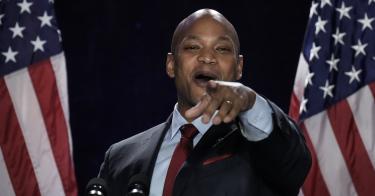Families and students in Maryland can breathe a sigh of relief after lawmakers agreed to provide $9 million in funding for the state’s school choice scholarship program for low-income families. The program was originally on the new governor’s chopping block.
Gov. Wes Moore’s fiscal year 2024 budget called for a 20% cut to the state’s $10 million scholarship program. He also stated his desire to entirely phase out the Broadening Options and Opportunities for Students Today, or BOOST, program, even though its price tag is a pittance compared to the state’s record $8.8 billion in spending on K-12 public schools.
Lawmakers in Annapolis restored $1 million in cut funding and removed language that would have eventually ended the program.
Moore’s initial plan to cut BOOST scholarships is a useful reminder that in politics, historic “firsts” often help candidates more than their constituents. Those constituents include many low-income students in Baltimore who likely felt a rush of pride seeing a black man ascend to the state’s highest office.
Moore himself stressed the historic nature of his gubernatorial victory. Indeed, he was sworn in on the Bible once owned by Frederick Douglass.
While Moore paints himself as a proud son of Baltimore, he actually attended Riverdale Country School, a tony private school with ivy-covered buildings that sits on 27.5 acres in the Bronx, New York. Tuition and fees there currently total $61,305 per year. The governor later graduated from another private school, Valley Forge Military Academy and College, before enrolling at Johns Hopkins University.
Moore’s early education surely fueled his long list of professional accomplishments, so it is unlikely that he opposes private schools in principle. It is hard to imagine him managing the state’s budget if he had attended one of the 23 Baltimore schools that did not have a single student who was proficient in math in 2022.
The parents working to save the BOOST program want the same fighting chance for their children that the governor’s mother wanted for him.
BOOST is not perfect by any means. The average scholarship is less than $3,500, a fact that likely explains why the program serves a disproportionate number of students who were already enrolled in private schools. But the interest groups and ideologues who want to shutter BOOST do not oppose it because it serves too few families.
Moore and anti-school choice advocates claim public dollars should not go to private schools. Yet they apply this stance only to K-12 education. No one has ever called for restricting the use of publicly funded Pell grants only to public universities. Perhaps that is because there is not a union for college professors and university administrators that is as politically influential as local and national teachers unions. Both oppose expanding charter schools and any type of school choice voucher program.
The same groups have encouraged the last two Democrats in the White House to cut a similar program in Washington, D.C. Congress created the D.C. Opportunity Scholarship Program in 2004 after local parents organized an effort to provide education options for low-income students. One of Barack Obama’s first acts as president was to try to axe the program. Ultimately, he was unsuccessful.
President Donald Trump increased funding for the program, but the political football was tossed again in 2021, when the Biden administration took over. Much to the delight of the National Education Association, the nation’s largest teachers union, one of the first things the current administration did was move to phase out the program.
In Maryland, Moore’s initial plan to phase out the BOOST program would’ve meant fewer chances for students from low-income families to get a good education. Instead of pulling the plug, Maryland lawmakers should follow the example of other states that have embraced innovative school choice policies.
Neighboring West Virginia, for example, is one of five states that have moved to universal choice programs for all students that focus on funding students, not systems. These states recognize that the funding source and beneficiaries in a “public” education systemmatter more than the way it is delivered—public, private, or home-school.
Seven other states have developed education savings accounts for specific populations only, including low-income families and students with special needs.
These programs put the key decisions about a student’s academic future in the hands of the people who care about them most—their parents.
What is happening in Maryland should be a cautionary tale to all voters. The politicians who try to convince you that they understand your plight because you share the same skin tone often serve special interests instead.
Any politician who opposes school choice should send their own children to the low-performing public schools that they consign poor families to attend.
Progressives claim to work on behalf of the poor and middle class. But when it comes to school choice, their message is clear: Teachers’ unions matter more than students, and private schools are only for people who can afford them.
This piece originally appeared in The Daily Signal




